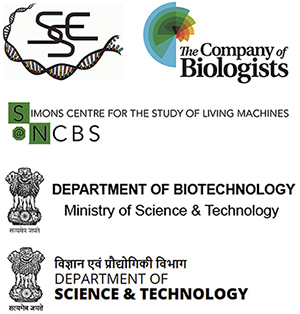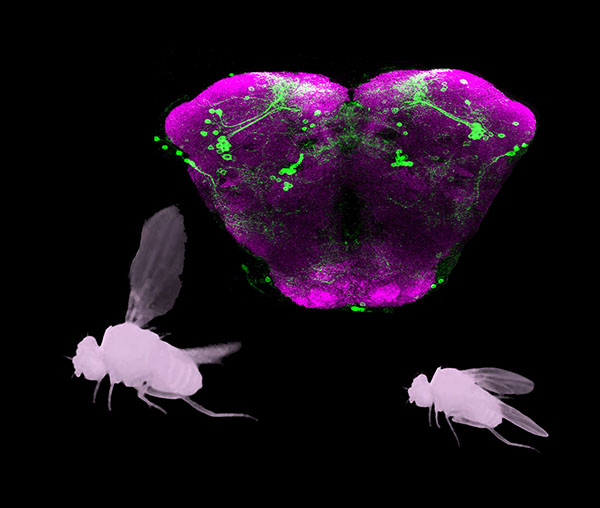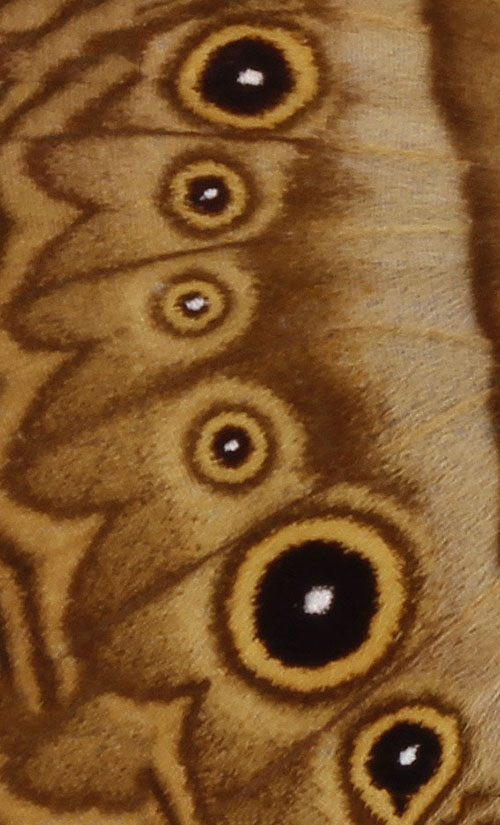Genetics Of Adaptation (SYMPOSIUM)
 Dates: 28 November to 2 December 2016
Dates: 28 November to 2 December 2016
Venue: Dasheri, NCBS
Sponsored by: The Society for the Study of Evolution (SSE)
Simons Centre for the Study of Living Machines
Department of Biotechnology (DBT, Govt. of India)
Department of Science and Technology (DST, Govt. of India)
The Company of Biologists
National Centre for Biological Sciences (NCBS)
Organizers: Dr. Deepa Agashe, Prof. Gaiti Hasan, and Dr. Krushnamegh Kunte
In 2016, the National Centre for Biological Sciences (NCBS, Bangalore) is celebrating 25 years of cutting-edge research in biological sciences, and is organizing a string of international academic meetings. The evolutionary biology and genetics groups at NCBS are organizing an international symposium on the Genetics of Adaptation.
 Our goal is to bring together a broad representation of evolutionary biologists, geneticists and developmental biologists who study the evolutionary drivers and genetic and developmental mechanisms of key adaptations in nature. Ideally, participants will either be evolutionary biologists with notable accomplishments in genetics and developmental biology of adaptations, or geneticists and developmental biologists whose work informs ideas in population genetics and evolutionary theory/genomics. Together, we will aim to synthesize recent developments in evolutionary biology, population genetics, ecological genetics, evo-devo, and developmental tools and genomics technologies, which have fueled explosive growth in understanding molecular genetic and developmental bases of adaptations even in non-model organisms. The case studies (and speakers) are being carefully chosen to include adaptations for which both the evolutionary/ecological significance and molecular genetic/developmental bases have been studied well in the past few years.
Our goal is to bring together a broad representation of evolutionary biologists, geneticists and developmental biologists who study the evolutionary drivers and genetic and developmental mechanisms of key adaptations in nature. Ideally, participants will either be evolutionary biologists with notable accomplishments in genetics and developmental biology of adaptations, or geneticists and developmental biologists whose work informs ideas in population genetics and evolutionary theory/genomics. Together, we will aim to synthesize recent developments in evolutionary biology, population genetics, ecological genetics, evo-devo, and developmental tools and genomics technologies, which have fueled explosive growth in understanding molecular genetic and developmental bases of adaptations even in non-model organisms. The case studies (and speakers) are being carefully chosen to include adaptations for which both the evolutionary/ecological significance and molecular genetic/developmental bases have been studied well in the past few years.
We are aiming to bring together people who work on various organisms, from bacteria to plants and animals, and in areas from basic (e.g., population genetics and evolutionary biology) to applied sciences (e.g., agricultural genetics). The total number of participating PIs is expected to be 25-30, plus a selection of advanced PhD students and post-docs. We will have plenty of time for both formal and informal discussions and interactions throughout the symposium.
Tentative daily schedule:
9.30-11 am: Talks
11-11.30 am: Coffee break
11.30-1 pm: Talks
1-2 pm: Lunch
2-4 pm: Posters
4-4.30 pm: Coffee break
4.30-6 pm: Talks
6-7 pm: Group discussions
7 pm onward: Dinner
Most talks will be 20-25 mins + 5-10 minutes for discussion.
There will be a series of workshops on 28 November for student participants.
All the talks will be organized in the following themed sessions:
1. Theory and Modern Methods in Evolutionary Genetics and Genomics
2. Variation and Adaptation
3. Genetics of Social Interactions
4. Interactions with the Environment
5. Genetic Architecture of Adaptations
6. Timescales of Adaptations
The schedule of talks and final daily schedule will be posted by mid-October.
Invited speakers, along with tentative titles of their talks:
- Dr. Deepa Agashe (National Centre for Biological Sciences, India): The Evolution of Bacterial tRNA Genes
- Prof. Doris Bachtrog (University of California, Berkeley, USA): Chromatin Sinks & Sex-specific Aging in Drosophila: A Role for theY Chromosome?
- Prof. Adriana Briscoe (University of California, Irvine, USA): The Evolution of Colour Vision in Heliconius Butterflies: Genes, Physiology and Behavior
- Dr. Jean-Francois Ferveur (University of Bourgogne, Dijon, France): Incipient Speciation in Drosophila: Genes, Sensory Signals and "Eco-devo" Adaptation
- Prof. Jonathan Flint (Wellcome Trust Centre for Human Genetics, University of Oxford, UK): Genetic Analysis of Complex Traits in Outbred Mice
- Prof. Nicolas Gompel (Ludwig Maximilian University of Munich, Germany): Regulatory Evolution and the Diversification of Pigmentation Patterns in Drosophila
- Prof. Gaiti Hasan (National Centre for Biological Sciences, India): Neuromodulatory Signals in Drosophila Larvae Drive an Adaptive Response to Nutrient Stress
- Dr. Kavita Jain (Jawaharlal Nehru Centre for Advanced Scientific Research (JNCASR Bangalore), India): Rapid Adaptation of a Polygenic Trait after a Sudden Environmental Shift
- Prof. Mark Kirkpatrick (University of Texas at Austin, USA): Sex-antagonistic Selection and the Evolution of Sexual Dimorphism
- Dr. Krushnamegh Kunte (National Centre for Biological Sciences, India): Evolution and Genetics of Sexually Dimorphic Butterfly Wing Patterns
- Dr. Christen Mirth (Monash University, Australia): Mechanisms Regulating Robust Versus Plastic Responses to Environmental Conditions in Developing Organs
- Prof. Antónia Monteiro (Yale-NUS College, National University of Singapore, Singapore): Evolution of Butterfly Wing Patterns and Behaviors in Response to Seasonal Environmental Variation
- Prof. Richard F. Mott (Wellcome Trust Centre for Human Genetics, University of Oxford, UK): Interpreting Genome Annotation and Genetic Variation from the Standpoint of Evolution
- Dr. George H. Perry (Pennsylvania State University, USA): Polygenic Adaptation to Tropical Rainforest Habitats in Human Hunter-gatherers
- Prof. Benjamin Prud’homme (Institut de Biologie du Développement de Marseille-Luminy (IBDML), France): The Evolution of Oviposition Site Choice in the Fruit Pest Drosophila suzukii
- Prof. Catherine Rankin (University of British Columbia, Canada): Genetic Dissection of Learning in C. elegans Sheds Light on the Adaptive Nature of Response Plasticity
- Prof. Vijay Sharma and Sheeba Vasu (Jawaharlal Nehru Centre for Advanced Scientific Research (JNCASR Bangalore), India): Genetic Basis of Chronotypes: Lessons from ‘Larks’ and ‘Owls’ Among Fruit Flies
- Prof. L. S. Shashidhara (Indian Institute of Science Education and Research, Pune, India): Hox Protein Ultrabithorax and Evolution of Insect Wing Number and Morphology
- Prof. K. VijayRaghavan (National Centre for Biological Sciences, India): The Anatomical and Functional Architecture of the Motor System
Email goa@ncbs.res.in for further information. Also see information about registration and participation.



